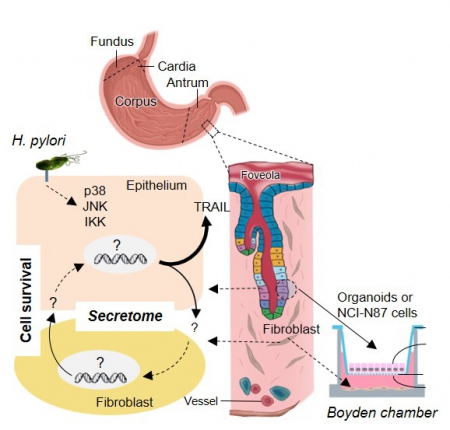MD8: H. pylori-induced stress response signaling in the gastric mucosa
|
|
The human pathogen Helicobacter pylori colonises the gastric epithelium and is a risk factor for gastric diseases including gastric cancer. The disease-promoting microenvironment involves, e.g. subepithelial fibroblasts. In order to characterize maladaptive responses at the epithelial gastric barrier we plan to study the H. pylori induced stress response signaling including p38, JNK and IKK activity and their role in cell survival. These studies will scrutinize the role of transcription factor nuclear factor kappa-light-chain-enhancer of activated B cells (NF‑kB) and activator protein 1 (AP-1) (cooperation Project P1-2 and Project 11-2). The role of stress response signaling for maladaptive processes in the gastric microenvironment will be investigated by co-culture of gastric carcinoma cells (NCI-N87) or gastric monolayer organoids, and fibroblasts in the Boyden chamber. Factors relevant for the maladaptation will be identified in the secretome of the cells (cooperation Project 12-2). H. pylori-induced stress response signaling in the gastric mucosa. The studies in gastric carcinoma cells (NCI-N87) or gastric monolayer organoids address the role of stress response signaling (p38, JNK, IKK) in H. pylori-associated apoptotic cell death. Maladaptive processes in the gastric microenvironment are investigated by co-culture of NCI-N87 cells or gastric monolayer organoids and fibroblasts in the Boyden chamber. Factors relevant for the maladaptation will be identified in the secretome of the cells. |
Photos: by UMMD, Melitta Schubert/Sarah Kossmann








